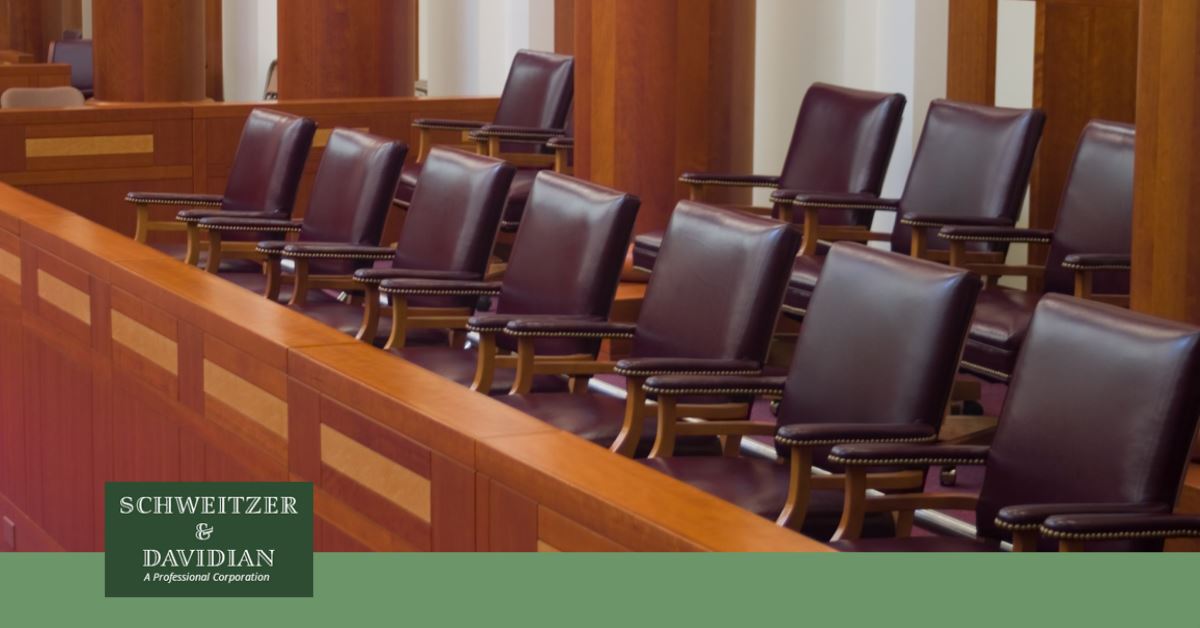There are numerous differences between the state and federal criminal justice systems. When you are facing charges for a federal crime, you need the assistance of a defense attorney who understands the unique steps of the federal criminal process. In this blog, we’ll provide a general overview of what occurs throughout a federal case. However, each case is different. To get more personalized information, contact us at Schweitzer & Davidian to discuss your case.
Contact our Criminal Defense Lawyer!
1. Investigation
The first phase of the federal criminal process is an investigation by a federal law enforcement agency.
This could be the:
- Federal Bureau of Investigations
- Drug Enforcement Administration
- Bureau of Alcohol, Tobacco, Firearms, and Explosives
- Department of Homeland Security
There are also numerous specialized task forces that investigate specific types of federal crimes. A recent example is the COVID-19 Fraud Enforcement Task Force that was formed in May of 2021.
During the investigation phase, these agencies will investigate and collect evidence of the crime.
2. Charging
Once the investigators have collected sufficient evidence against the suspect, the prosecutors will present this evidence to a grand jury. This is a group of around 20 impartial citizens who will view the evidence and determine whether or not the suspect should be charged with a crime. Grand juries are required for all federal felonies, but not federal misdemeanors.
If the grand jury votes that the individual should be charged, the suspect will then be indicted and notified that they are facing charges.
3. Arraignment
Either the day of, or day after, the defendant’s arrest, they will be brought before a judge for an initial hearing. During this hearing, the defendant will:
- Be made aware of their rights
- Be informed of their charges
- Make arrangements for getting a defense attorney
- Either be held in jail or granted bail
If the individual is believed to be a flight risk or has a prior criminal record, they will likely not be offered the opportunity to post bail.
4. Discovery
During this phase, both the prosecutor and defense attorney prepare for the trial.
This is done by:
- Learning the facts of the crime
- Speaking with witnesses
- Studying evidence
- Considering any issues that could arise during the trial
Throughout all of this preparation, both sides craft a trial strategy.
5. Plea Bargaining
If the prosecutors and government have a strong case against the defendant, they may offer them a plea bargain. If the defendant accepts, they must plead guilty in exchange for a reduced sentence or in order to skip trial.
6. Preliminary Hearing
The preliminary hearing is sometimes referred to as a ‘mini-trial.’ During this phase, the prosecution can call on witnesses and present evidence. Defendants have the right to waive this hearing, but they are usually held if the defendant pleads not guilty.
If after this hearing the judge decides there is enough valid evidence against the defendant, they will move forward with a trial.
7. Pre-Trial Motion
The prosecutor or defense attorney may file motions to the court.
Common motions are:
- Motion to dismiss: requesting the judge dismiss certain evidence or the case as a whole
- Motion to suppress: requesting certain statements or evidence are not introduced during trial
- Motion for change of venue: if the case has received a lot of publicity prior to trial, they may request that the location of the trial be moved out of the area
8. Trial
Finally, the official trial begins. During the trial, all evidence and witnesses will be presented in front of a fair jury. The trial will end with the jury determining whether the defendant is guilty or not guilty. Their ruling is the official verdict.
9. Post-Trial Motions
If the defendant is found guilty, their attorney can file post-trial motions to try and change the outcome.
- Motion for a new trial
- Motion for judgment of acquittal
- Motion to vacate or correct a sentence
10. Sentencing
The judge will determine a sentence for the defendant based on the circumstances of the crime. Some offenses require mandatory minimum sentences, where the judge must sentence the defendant to a set amount of time in prison. If the defendant was convicted of a capital offense, the judge would determine whether or not to impose the death penalty.
11. Appeal
If there was a significant error that the defendant believed affected the outcome of their case, they have the right to file an appeal. If successful, the verdict may be overturned, altered, or a new trial may be ordered.
For a more detailed explanation of these 11 steps, click here.
California Federal Crimes Lawyers
Federal cases are often long-lasting and demanding. If you are facing federal charges, you need a defense team that will work tirelessly on your behalf. We understand that our clients are trusting us with their futures, and we do not take that responsibility lightly. To speak with our federal defense attorneys today, give us a call at (559) 206-2322.


